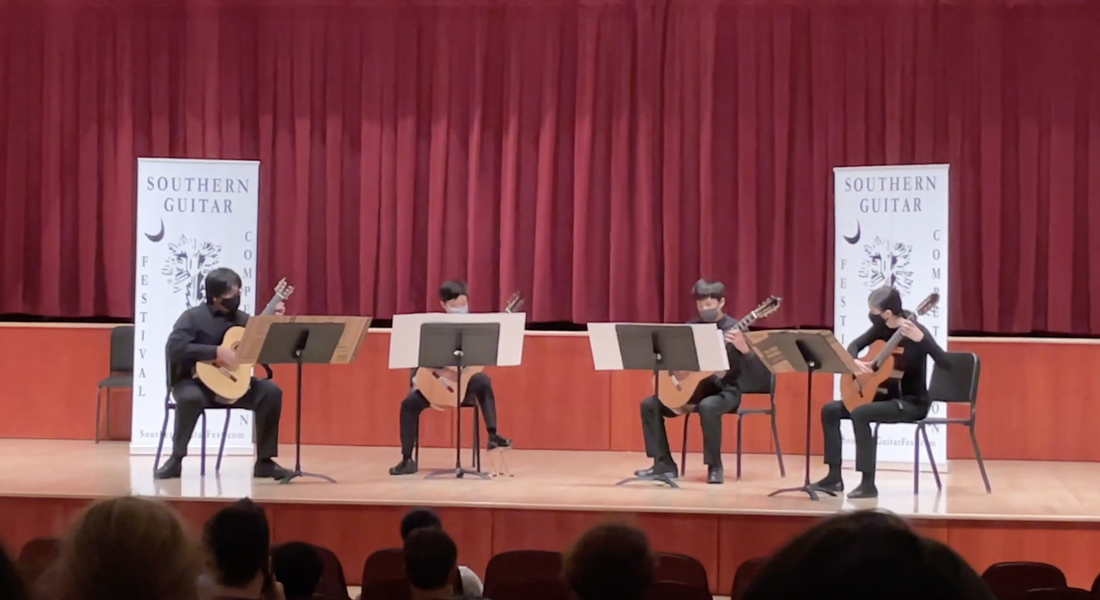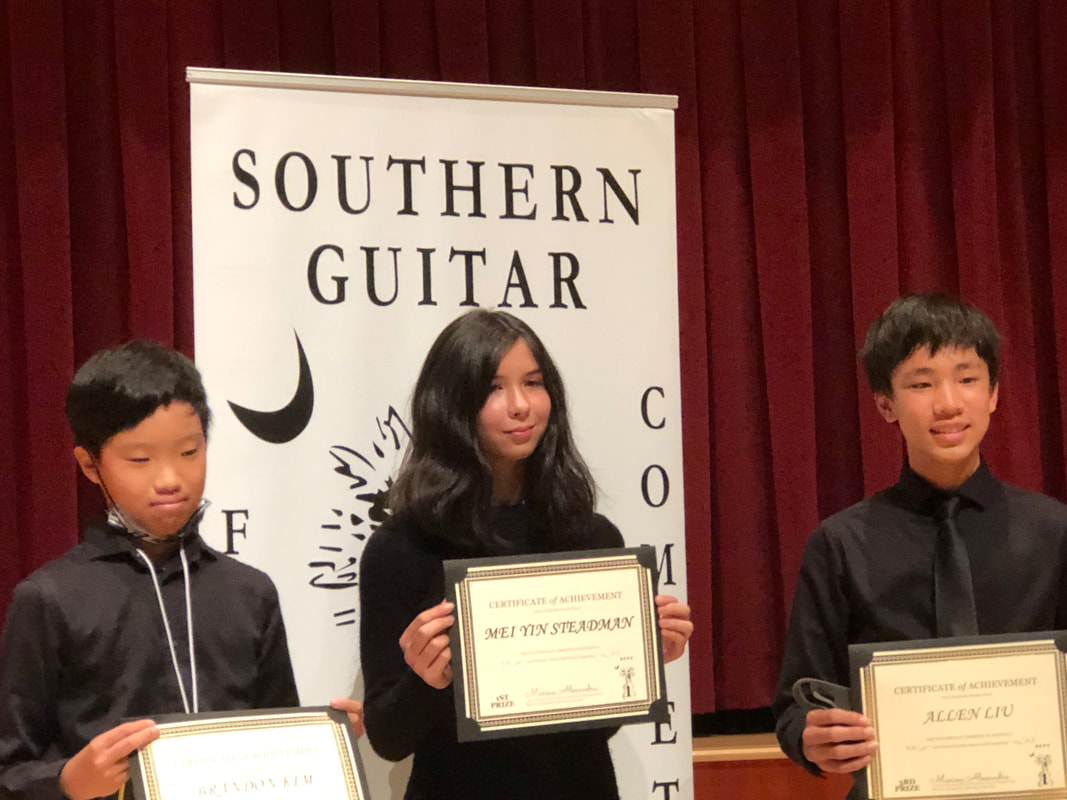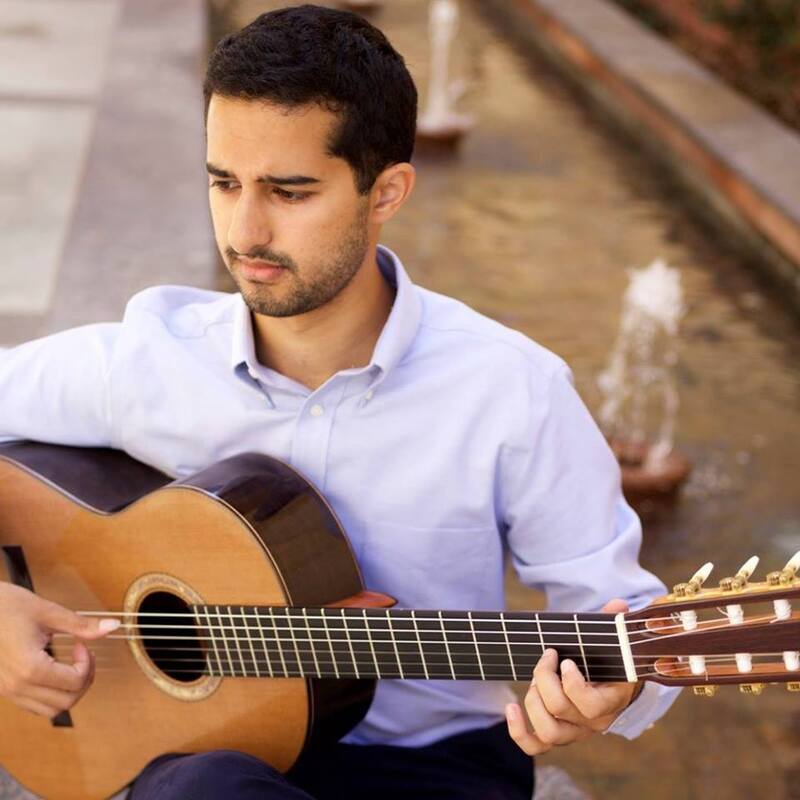|
Imagine that you've spent weeks rehearsing together as an ensemble, fine-tuning your skills and playing in sync until you are in perfect harmony with one another... then the whole world shuts down and you can no longer meet up in person. Now, you suddenly have to grapple with new technology and try to replicate the ensemble experience online, as you deal with internet lag and audio problems. That was the experience for the Orpheus Honors Quartet, which is made up of four high-level guitar students: Allen, Brandon, Mei Yin, and Michael, as well as their teacher, myself! Together, we rehearsed virtually for many months, and learned some tips and tricks for how to collaborate effectively along the way. Our hard work paid off when we participated in the Southern Guitar Festival and Competition in May, where the quartet took home 3rd place! Following the competition, we spent time preparing for the Southern Guitar Fest's showcase in North Carolina, and I truly believe all four members of the quartet could now be considered experts in working together online. I took the time to interview the Honors Quartet about their collaboration, and what advice they have for others looking to connect and make music with others virtually. Stephen: You're all experienced performers and you've participated in many, many ensembles being at Orpheus for so long. What is the difference between rehearsing with others in person versus virtually? Allen: Well rehearsing virtually, there's just a lot of problems that come with it. You can't really play together. There's also all the problems with like wi-fi, mic quality, noise cancellation, echo, “Original Sound.” It's kind of just hard to hear good guitar playing over Zoom calls. Brandon: Online, it's a little bit harder to communicate with everyone. If you're communicating offline there’s at least better synchronization because we can all see each other well, and therefore a better performance. "Being aware of every aspect of your playing and your setup before you enter a group situation. Yeah, everyone as individuals, your preparedness and how set up you are and ready to go really has a big impact on the dynamic of a rehearsal, especially when it's online."Stephen: Being the high-level performers that you are, and working together virtually as long as we did, what advice would you have for other students who want to collaborate or play virtually? Allen: Try to listen to your playing as much as possible when you're having those online rehearsals. Sometimes your mic can have problems or your wi-fi could go out and stuff like that, and you might not hear some problems with your playing. So if you see something just address it, you could get it fixed or [otherwise] you could just have it as a bad habit for a long time until an in-person rehearsal. Also, turn “Original Sound” on. Stephen: Yeah, so “Original Sound” and a little bit more self-aware practice. Being aware of every aspect of your playing and your setup before you enter a group situation. Yeah, everyone as individuals, your preparedness and how set up you are and ready to go really has a big impact on the dynamic of a rehearsal, especially when it's online. Stephen: Mei Yin, have you or the group encountered any technical issues while rehearsing over Zoom, and what workarounds did we find? Mei Yin: Internet connectivity problems, and we used ethernet and yeah, usually ethernet and stuff and sometimes upgrading wi-fi to get better connections. And then also playing individually, so our sounds wouldn't overlap and sound bad and distorted because there’s usually lag. Stephen: Yeah totally, upping our internet connection, I think. Having a good internet connection made everything more fluid, and microphones I think. Pretty early on Mei Yin you all invested in a nice microphone, and Brandon and Allen too have nice audio setups. Definitely helped. Stephen: We rehearsed virtually for a recent competition for many weeks, if not months, and then finally we were able to actually meet in person and rehearse outdoors. What was that like, being able to come together after all that time? Mei Yin: I think it was a lot easier and more connected and fluid when we came together in person, because we could all play together, as opposed to online when we each had to play individually. Stephen: Yeah, totally. Was it weird having your part learned and knowing how it fits into the ensemble as a whole, but never having played it in person? And then all of a sudden, being in person and able to play it with everyone, and everyone else knows their parts. Was that kind of strange? Mei Yin: I wouldn't say it was strange, but I thought it was nice to hear all the parts together as one in person. Stephen: Allen, this question is for you. What were some of the things that you did individually to keep up the energy while we were rehearsing online? Allen: When someone else's mic is unmuted and they're playing I would just play with them with my mic muted, so I could get a sense of what it would sound like in person. Stephen: Interesting, so you had the opportunity to play along with other parts without affecting that person. Because we had the option of muting/unmuting, that gave you a little flexibility to practice along with other people or practice your parts during a lull. Whereas otherwise I would get a little mad at you if you were practicing your part while I was talking [laughs]. Good! Stephen: Brandon, can you tell us about the process of preparing for the competition and what pieces we played? Brandon: Well, getting ready for the competition for me was a little bit uneasy, but eventually yeah we pulled through. We played the songs “West Side Story” by Bernstein, and “A Poem” by you. Stephen: Allen, this is for you. What was it like working with the composer of one of the pieces, myself, while we were rehearsing. From your point of view was I more picky with that song in particular, or was it different? And no pressure, you can say whatever you want about working on my piece, my feelings will not be hurt. Allen: Okay. You weren’t pickier, but I feel like you just had a more clear view of what you wanted the piece to sound like. Like in other pieces, you would experiment more to see what sounded better. But you generally knew what you would intend for the piece to sound like. Stephen: Yeah, that makes a lot of sense. I hadn't actually thought about that difference myself, but I guess it makes sense that when you write a piece you generally have a pretty good idea of how you think it should go. Stephen: Mei Yin, another one for you, can you tell us about the Southern Guitar Fest that the Trio, now Quartet, recently participated in? Mei Yin: So it was originally held online, and we submitted videos. Yeah, I guess it was practice of running through it many times. Then, I also think listening to each other and listening to our playing to help us improve the recording for the next time. Stephen: I think that's big. We did two back to back recording sessions: do one and then listen and then do another one after having listened and made a bunch of notes. And I think both of the times, the second one was always better because you guys made so many improvements. We did two back to back recording sessions: do one and then listen and then do another one after having listened and made a bunch of notes. And I think both of the times, the second one was always better because you guys made so many improvements.Stephen: Mei Yin, how did you feel the competition went? What was it like waiting for the results to come in after we had submitted our videos? Mei Yin: I think the competition went pretty smoothly because it was online. We just submitted the video and there wasn't much, like hassle to it or anything. Personally for me, waiting for the results wasn't that bad. Like I don't find it as bad when it's online compared to in person, because in person you have to like, sit there through the concert before they announce the results. I personally didn't find it that nerve-wracking waiting. Stephen: Brandon, how did you feel coming in third place, and how did you celebrate after we got that great news? Brandon: It was very exciting when I heard that we received third place, when so many people participated in the competition. So I celebrated by being happy for around one to two hours. Stephen: That's a great way to celebrate, it lasted one to two hours, that's it? Brandon: Yeah, that's pretty long for me. Stephen: [laughs] So two hours and then just back to normal? Brandon: Mm-hmm. Stephen: Gotcha. Stephen: What's next for the Orpheus Honors Quartet, what are you currently working on and what's the next goal? Michael, maybe you can take this one. Michael: I know we're working on two pieces right now, I think “La Follia.” And then there's the Vivaldi one I think. There’s another one called “Quest.” And then we're obviously playing in [North] Carolina for the performance thing. Stephen: You joined the group fairly recently in the last couple months. You had to learn a lot of music really fast. What was the process of learning all that music like? Michael: I took it like how I take any new piece: I don't think about the whole piece, I think about just certain sections, like a few measures, play them really slow and try to make every single note perfect. And when I feel comfortable, I just speed it up. I repeat that for other sections and then eventually I put them together and then get them up to speed. Stephen: Great. Those are all great practice strategies: doing slow practice, working in small sections, and just doing everything very gradually. Stephen: The Quartet has played a few different styles of music. We’ve played Baroque music in “The Telamon,'' we've played some contemporary music in the “La Follia” and “The Quest.” What kind of pieces do you enjoy playing the most with the group? Michael: Probably right now it's “La Follia,” just because I feel like it's different than anything I play. It kind of tells a story if you think about it, and then there's so many different types of textures. Just sounds really different, in a good way. Stephen: Michael, I like what you said about it telling a story. That piece does kind of morph over time and change in beautiful and unexpected ways, like a story. Stephen: Another one for you Michael. What aspect of ensemble music is most enjoyable to you? Michael: Probably a little bit of everything. I've been in previous ensembles like a few years ago, they weren’t anything compared to this. All those other things were just like a few weeks, maybe a few months I think. But I mean we kind of just played and then kind of got it over with. There wasn't really any bonding. [Now] it's kind of enjoying what you play rather than just playing it to play. Stephen: Totally. That is so cool. Stephen: Okay, and this is the last question for everybody. The four of you were invited to perform live at the North Carolina festival called Southern Guitar Festival and Competition, after receiving a top prize in an ensemble competition. Is there anything that any of you are looking forward to in particular about that trip? Mei Yin: I always like to travel for competitions, I think it's fun. Yeah I think it will be interesting to go to the festival as well, because I usually like going to other festivals and going to master classes and stuff and seeing other people. Allen: I'm looking forward to just listening to the other people play, since they were extremely good at guitar, the ones that we competed against. Following this interview, the Orpheus Honors Quartet performed at the Southern Guitar Festival, where Allen, Brandon, and Mei Yin each entered the festival's solo competition and all won prizes!
Comments are closed.
|
|
Music Education Programs
|
Visit Our NW Austin Music School
|
Visit Our Cedar Park Music School
|
|
© Copyright 2022 Orpheus Academy of Music.
|
Website by Never Alone Business Services
|






